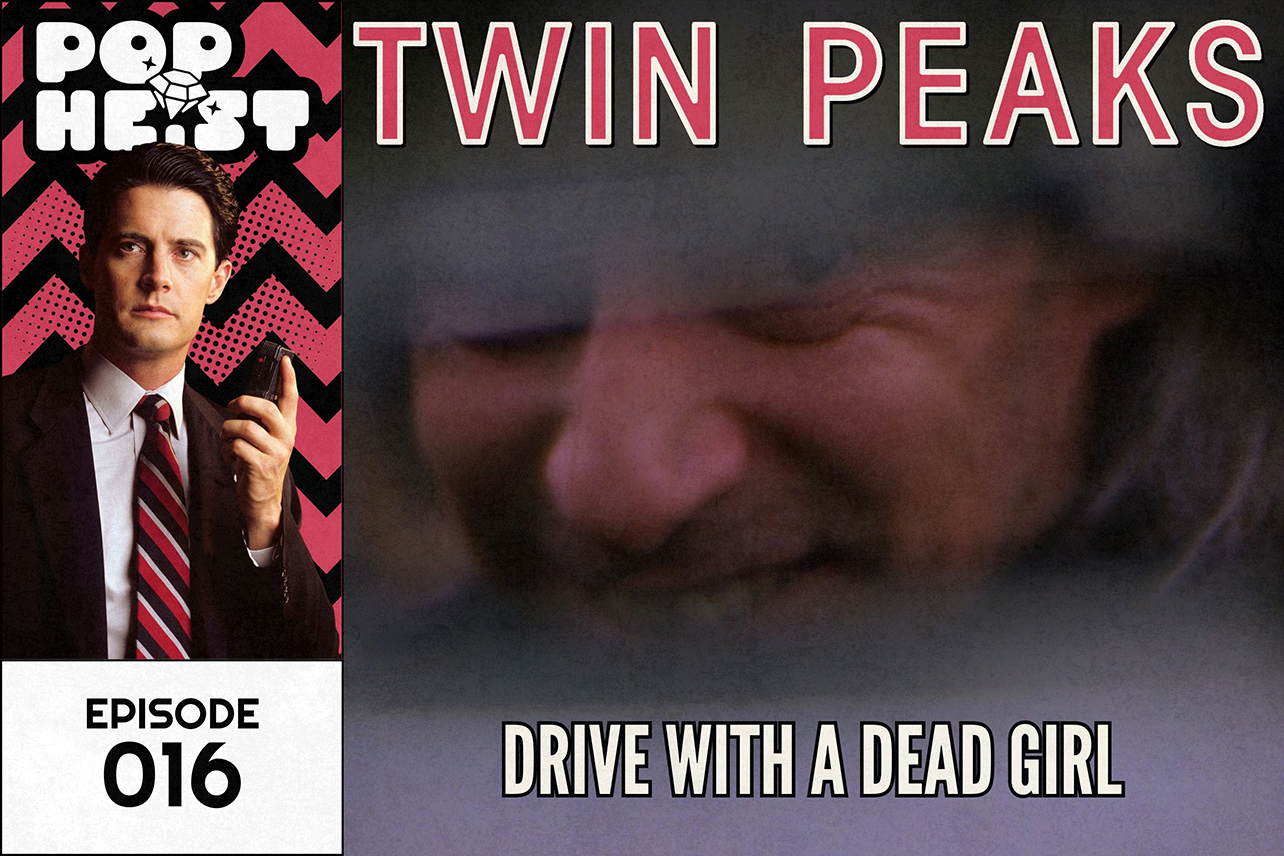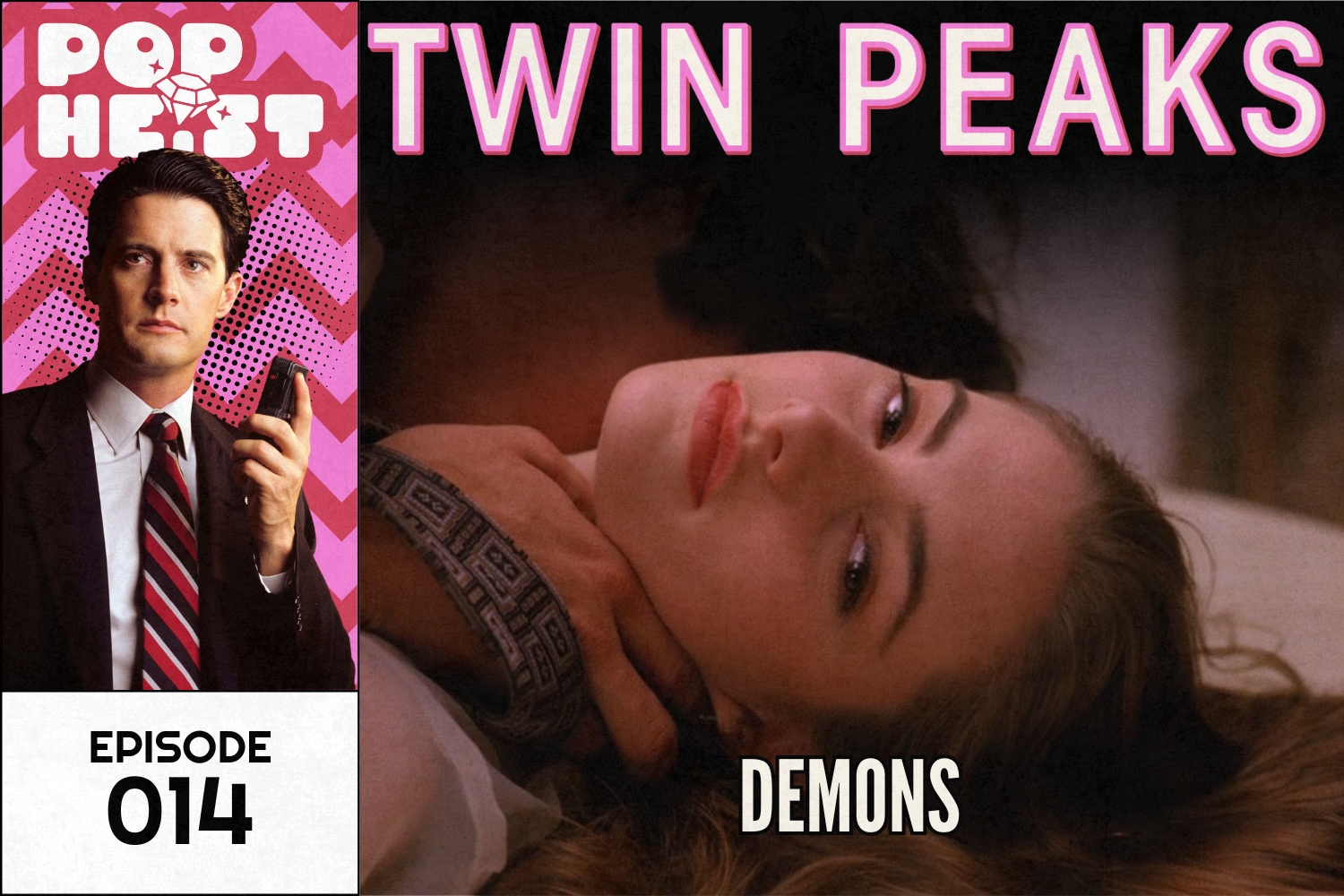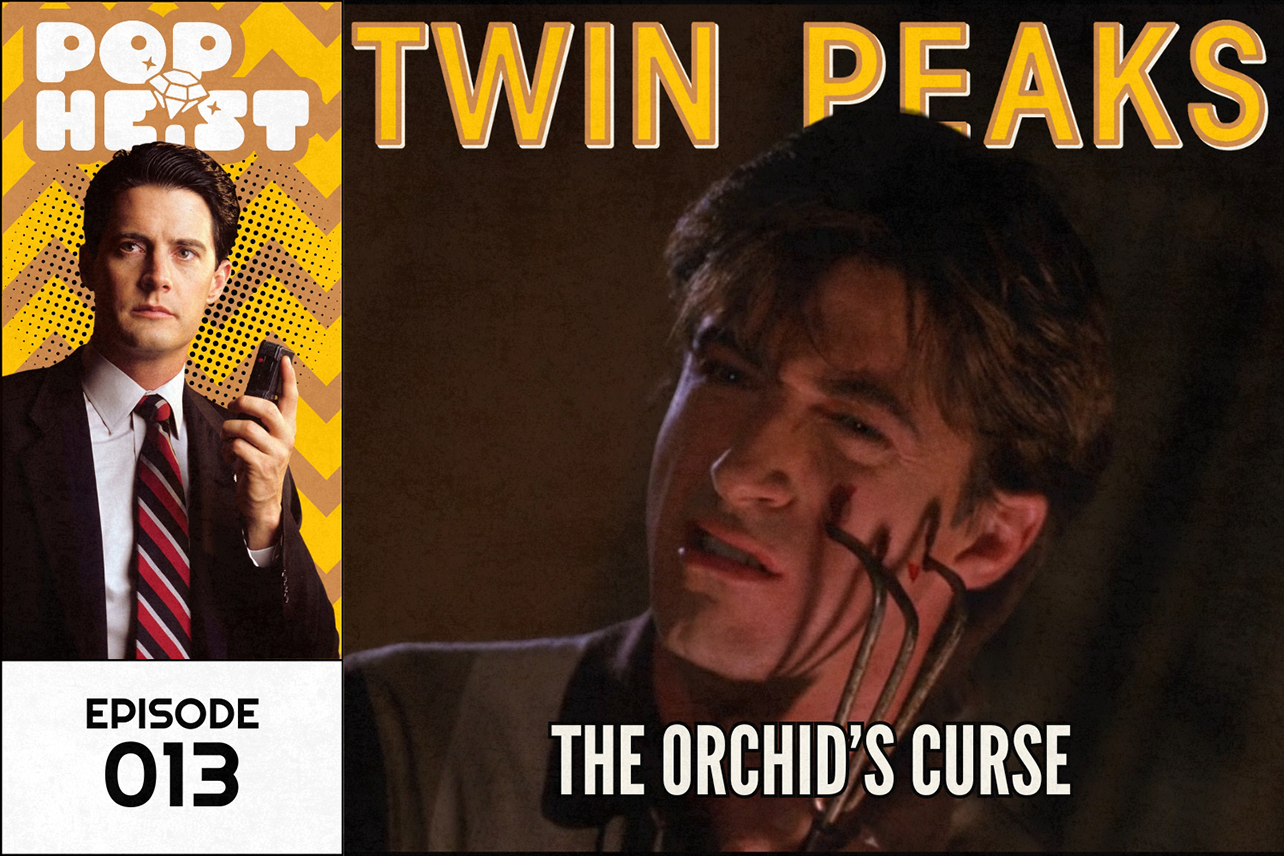In PRESTIGE PREHISTORY, Pop Heist critic Sean T. Collins takes a look at classic TV shows that paved the way for the New Golden Age of Television — challenging, self-contained stories from writers and filmmakers determined to push the medium forward by telling stories their own way.
The Prisoner Episode 5 (airdate order) / Episode 6 (AVC order)*
"The Schizoid Man"
Original airdate: Oct. 27, 1967
Writer: Terence Feely
Director: Pat Jackson
Cast: Patrick McGoohan, Patrick McGoohan, Anton Rodgers, Jane Merrow, Earl Cameron, Angelo Muscat
*NOTE: The Prisoner's proper running order is a matter of dispute; Pop Heist is using the AV Club order for the show
Number Six is his own worst enemy. Time and again we've seen the Village and its various Numbers Two use their prisoner's indomitable will and determination against him. The bolder the move he makes, the deeper the trap they catch him in. Our last episode's arduous journey to "London," a trip calculated to give Six hope only to dash it, only happened because he made it happen. The escape attempt with the other prisoners, the run for office — all of it is designed to turn his strengths into weaknesses.
Pitting him against a doppelgänger of himself so that he's literally his own worst enemy, though? Major points for creativity to the new Number Two (Anton Rodgers), or whichever of his masters or minions — Number 106, a Haitian serving as this week's control room supervisor, may have been involved — came up with this scheme. Maybe the butler (Angelo Muscat) did it; in this episode he reveals that he's a masseur as well as a manservant, so anything's possible.
But it's the multiple layers to the scheme that make it so deucedly difficult for Six to evade. If the Village had simply taken the time to give another agent really great plastic surgery and enough time to memorize Number Six's likes, dislikes, and life story, that would be one thing, and probably easily swatted away by Six himself.
However, the manipulation begins early. Likely having sensed Six's weakness for pretty women by now — weakness is a relative term, of course; it's not like he's having sex with them, it's just that they're the only kind of person he seems to like by default — they set him up with Number 24, a woman named Alison (Jane Merrow).
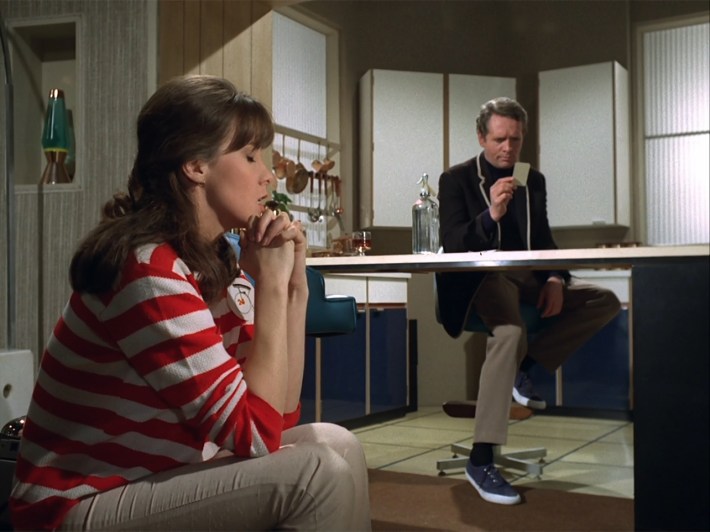
Together they practice that mind-reading card gimmick you may recall from the opening of Ghostbusters: Number Six holds up a card featuring one of several shapes with its back turned to Number 24, and she attempts to psychically determine which shape it is. With a track record of around 75% correct, who knows, maybe telepathy exists in the Prisoner universe along with all of its fantastical mind-control and security technologies.
Number 24 is just the prelude to the main event, however. One night, Number Six is hypnotized, drugged, and shipped off to the hospital. He spends an indeterminate amount of time there, where the Village's scientists have him grow out his beard while also using electric shocks to condition him to be left-handed instead of a righty. When he wakes up, the date on the calendar remains what it should be, but he's got black hair and a full black mustache — and a new identity, Number 12. (Twelve is six doubled, of course. For that matter, 24 is 12 doubled.) They even change Six's favorite breakfast from eggs and bacon to flapjacks, and lots of them.
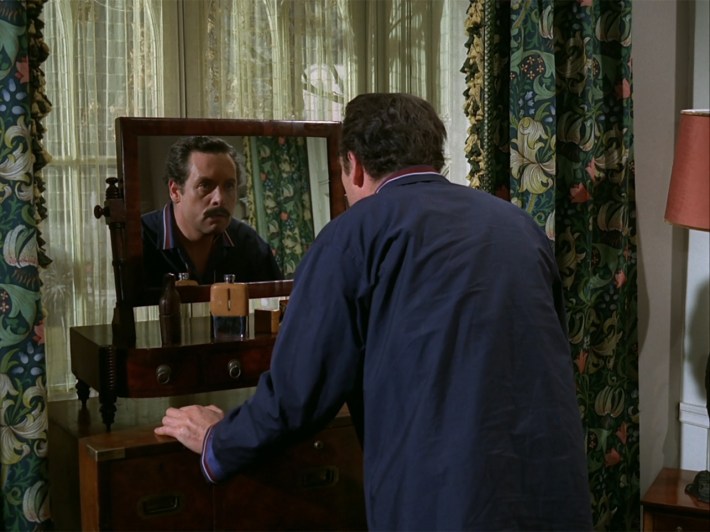
Naturally, "Number 12" gets a hearty "welcome, dear boy!" or "old chap!" or whatever from Number Two, who pretends they're old colleagues going way way back to when "Number 12" was first courting "Susan," whoever that might be. (He finds out later, to his sorrow.) He then gives "Number 12" his mission: He's to pose as Number Six in order to cause the "real" "Number Six" (sorry about all the sneer quotes but that's kind of the deal here) to question his identity and give up the goods.
And lo and behold, in walks "Number Six" (Patrick McGoohan, again) — wearing a white blazer with black piping instead of the other way around, and generally acting like the unflappably wise-cracking side of the guy we've come to know. Six, of course, is adamant that the man is an impostor and that he himself is the real deal.
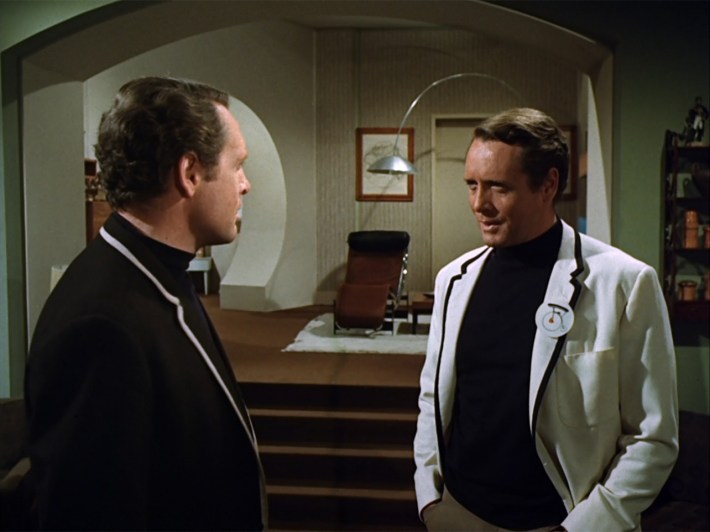
His subsequent ordeal sees him grow more and more frustrated with his inability to prove his case. Challenged to shooting, fencing, and boxing competitions by Temu Six, the real Six gets his ass kicked time and again, no doubt because of his newfound uncertainty about which hand he favors. Even physical characteristics such as fingerprints and moles have been carefully forged by the Village to make Great Value Six look like the real thing. (Six's actual mole, it would appear, was surgically removed while he was under Village control.) Bizarro Six, of course, is having a grand time during all of Real Six's woes, cackling with glee as Six suffers from nightmares. "It won't be long now, Number 12," Two tells his deep-cover agent.
But Number Two makes a crucial mistake. While pretending to reprimand the science team for failing to give "Number 12" a mole so he can successfully "pose" as Number Six, Two puts one of the guys who reprogrammed Six on the big screen to scold him. This is enough of a cue, it seems, for Six to suddenly remember his whole ordeal in the hospital. He also remembers that electric shocks are what switched him from orthodox to southpaw, so he carefully gives himself a shock in his apartment, restoring himself to righty status. And if you've seen Number Six throw hands, you know it's now all over but the shouting.
Sure enough, Number Six trudges over to "Number Six"'s house, pretending to be completely broken and unsure of his identity. When Store Brand Six lets his guard down, Real Six attacks. When their brawl spills into the street outside, Rover comes roaring along to sort the mess out. And though both Sixes tell the orb the correct password — "Schizoid Man" — the entity absorbs and kills Fake Six. In the midst of their battle Six swiped his impersonator's fake mole and put it back on his own wrist, which may well be the reason.
With "Six" dead, Six can now pose as 12 unimpeded. He blusters his way back into Number Two's good graces, despite both of them being in for a hell of a dressing-down when the powers that be learn of (they believe) the real Number Six's demise. But as "12" and Two chat, it becomes increasingly clear that the Village chairman suspects he's helping the wrong man leave the facility to fly back home.
It's the aforementioned Susan (remember her?) that gives things away. Having found a photo and note from Number 12's "loving wife, Susan" in his effects, he simply assumes the two are still married and talks repeatedly about seeing her and speaking to her when he returns to the homeland. Up, up he goes in a helicopter, blindfolded so as to preserve the Village's secret location … and down, down he comes, right back to where he started. "Susan died a year ago, Number Six," Two tells him matter-of-factly to close the episode.
This episode is, if you'll pardon the pun, doubly fascinating to me. From the start, The Prisoner has been an exploration of identity, of how much you can strip away from a person and expect him to remain the same person. Assaulting Six's sense of identity directly feels inevitable in that light; the use of a surgically created doppelgänger, actually an agent called Curtis, to supplant and confuse him is the kind of creativity we've come to expect from the Village administrators.
Considering the amount of screen time the two Sixes share, the late-Sixties special effects that enable them to appear together in the same shot is shockingly effective. Their hand-to-hand combat in particular is very visceral, in part because of McGoohan's fists-only fighting style, here doubled, but also because both men appear determined to be the only Six left standing by the end of it.
But could the doubling suggest something deeper? Whatever else it is, The Prisoner was made in the shadow of McGoohan's previous super-spy TV hit, Danger Man. (That's what Danger Mouse was parodying, if you didn't know.) It's no secret that McGoohan had grown bored with the role by the show's fourth season; The Prisoner, developed with help from Danger Man Season 4 script editor Doug Markstein, is essentially McGoohan doing a revisionist version of the character he'd just finished playing. The biting cynicism, the distinct lack of heroic catharsis, the overall absence of globe-trotting derring-do, with mind-bending psychological torture in its place: It's kind of like if Chris "Captain America" Evans created and starred as Homelander in The Boys. Is there a better visual metaphor for this than Patrick McGoohan, secret agent at large, duking it out with Patrick McGoohan, secret agent in chains?
(Also, are you familiar with a little show called Twin Peaks? Because I've got a feeling many of the trials and tribulations of the oft-doubled FBI Special Agent Dale Cooper can be tracked back to this episode.)
Still, the thing that really got to me had nothing to do with Six at all, but with Twelve, the traditional movie/TV secret-agent type sent to imprison him. Whoever he is, he had a wife who loved him, and who he subsequently lost, and — wait, did we just figure out why this person would agree to become another man in the first place? The surgery, the training, all of it: Is it the equivalent of Jim Carrey getting his memories erased in Eternal Sunshine of the Spotless Mind, or Adam Scott taking on a very strange day job so he can forget about his late wife in Severance?
Even if you're not buying this backstory (which I just made up as I wrote that paragraph), there's no two ways about it: Number 12, Curtis, loved a woman named Susan, who loved him back, and now she's gone. By the time we learn any of this we've already seen him be destroyed by Rover (now identified by this codename by both Six and Two, so there you go, official Orb name designated) in what looks to be excruciating fashion. It's hard to empathize with the kind of person who'd work for the Village organization, or who'd try to break Six in this way. It's hard for me, personally, to imagine that people with minds like that — fascists, I mean — can truly love the way real people can. But that's the life he built for himself, and that's the life that's over now, and even Number Six is made to wrestle with that.

There's one last thing to talk about here: a strange little coda to Number Six's relationship with Number 24. During the various ordeals Two puts him through in order to "prove" that the fake Six is really the real Six, Number 24 betrays him, deliberately guessing the cards wrong despite their mental connection. Before Six-as-Twelve gets into that helicopter, 24 approaches him to confess that she's ashamed of her behavior.
"It was your job," "Twelve" reassures her.
"It was a betrayal," she insists. "It's not often one gets a second chance," she says, before concluding "I wouldn't do it again."
Six doesn't know it at the time, but she's getting that second chance right then and there. She's telling the man she betrayed that she regrets betraying him. She's telling him she's sorry for what's about to happen to him. Her repentance is a day late and a dollar short, and likely cold comfort for a recaptured Number Six. But like the love story of Curtis and Susan, it's a glimmer of humanity in a world being slowly, steadily, deliberately purged of it.
And that's the most troubling thing about this episode: Number Six loses a little bit more of his humanity, too. After spending the season declaring "I am not a number, I am a free man!", he spends this episode telling anyone who'll listen that he, and he alone, is Number Six.
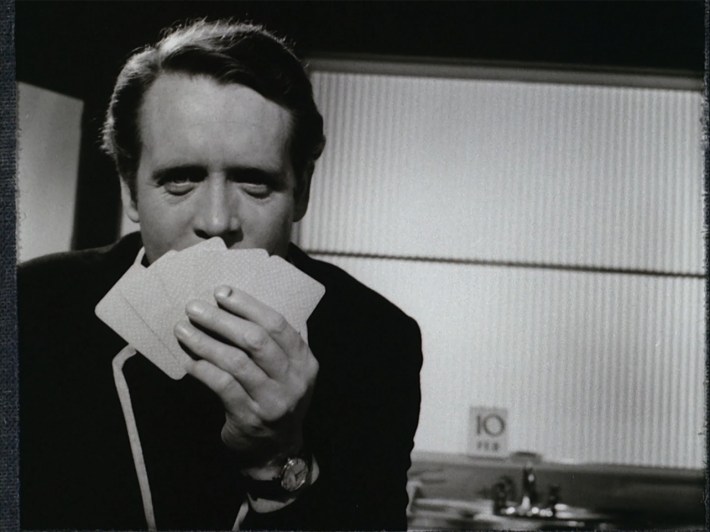
This recap was originally accessible to paid subscribers only, and future recaps in this series are available now for paid subscribers. If you haven't already, consider supporting worker-owned media by subscribing to Pop Heist. We are ad-free and operating outside the algorithm, so all dollars go directly to paying the staff members and writers who make articles like this one possible.

